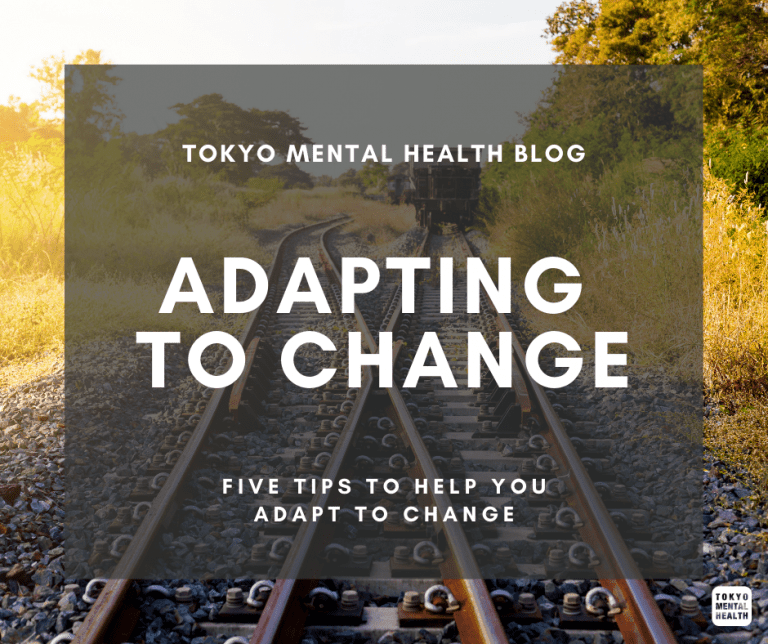- 2022/04/05
- Self Help & Tips

The effects of the COVID-19 pandemic have been manifold, but among the most pervasive is the amount of personal and societal change it has caused many people to go through. From major changes in employment and living situations to shifts in Japanese immigration regulations and restrictions regarding travel, many of us have had to adapt to change and navigate uncertainty in our personal and professional lives.
Although it can be most obvious to notice change when it occurs as the result of something negative, it is important to remember that change can also result from positive events and developments, like starting a new job or moving in with a partner. Whether as the result of positive or negative events, adapting to change in our lives can be a difficult process. As a result, it is important to understand the challenges of adapting to any kind of change and the strategies we can use to help maintain our mental and physical health.
Changes: the Good and the Bad
Having to adapt to change is a very common experience, and can occur both as the result of positive and negative situations. Examples of events that may cause you to adapt to change can include:
- Starting at a new job or school; ending your job or finishing at school
- Developing a chronic illness and/or disability
- Losing relationships with friends or family because of death or estrangement
- Moving to live in a new place and adapting to a new culture
- Retiring
- Beginning a new relationship; getting married
- Having a child
- Large-scale events in government and society, including changes in healthcare and immigration policies, natural disasters, pandemics, and conflict
The Mental and Physical Effects of Change
Whether the change is negative, positive, or a combination of both, going through a period of change can affect our lives and behavior in a variety of ways. Change often means a disruption of routine, stability, or expectations, all of which can result in increased levels of stress and loss of resilience. While coping with change looks different from person to person, symptoms associated with increased stress levels can include:
- Anxiety and depression
- Difficulty concentrating
- Mental, emotional, or physical exhaustion
- Sleep changes
- Irritability and mood swings
- Headaches
- Muscle aches or tension
Tips to Help You Adapt to Change
Recognize and find constructive ways to work through your emotions. It is normal to be fearful for the future, especially if you don’t know what to expect. Even in the case of positive change, feelings like sadness, fear, uncertainty, confusion, and nervousness may arise. Rather than suppressing them, it can be helpful to find constructive ways to express and work through these kinds of emotions. This can be talking with a friend about your concerns, exercising, recording your emotions in your journal, or any other activity that allows you to recognize and engage with your feelings in a way that is healthy and non-destructive.
Learn and practice what grounds you. Change can often bring about a sense of instability. When this occurs, recognize and learn what helps you feel a sense of security and reclaim your stability. For some, that is developing a good daily routine, which allows them to maintain a sense of structure even though much else is changing. For others, using techniques like mindfulness meditation can help maintain a sense of being centered, focused, and present when they feel overwhelmed. Other things, like staying connected with your favorite activities and people, can help you feel a sense of continuity before and after the change occurs.
One change at a time. If it is in your control, try to avoid undertaking several big life changes at a time. If possible, try to give yourself enough time to adjust to a life change before making other changes in order to avoid excess stress.
Cultivate skills that help you become more flexible. Change can be difficult because it often causes us to alter our plans and take different paths in life than we may have intended. During these times, flexibility can be very helpful, as it allows us to recognize that more than one path can be meaningful and valid for us, even if it is not the one we anticipated.
During periods of stability, you can practice cultivating flexibility by making small changes to the way you do familiar activities. For example, if you usually always eat lunch at home, try moving your lunch spot to a different location once or twice a week. This practice can help keep you more open to and prepared for change when it occurs.
Seek out the support of friends and family. Adapting to change can be an overwhelming experience, particularly when the change is out of your control. Staying connected with the most important people in your life can not only provide you with a sense of stability when change occurs, but can give you assistance in thinking through your options and helping you problem solve.
Learning to adapt to change can be a complex and difficult process. Counselors and psychologists can be expert resources in helping you develop resiliency and flexibility as well as providing support during times of uncertainty and change. If you are considering reaching out for support, please do not hesitate to make an appointment with us at Tokyo Mental Health.